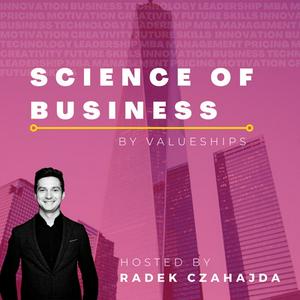8 Insights for Management from Sport Science
Since Moneyball, sport have gone through a transition from gut-driven decisions to using data to understand better how performance of elite athletes is shaped, how teams are built to win and how managerial decisions write sports history.
In fact, such data is much more available to scientists than data from corporate, so a lot of the models we use every day to manage our teams derive from sports science. For example, one of such models is equity theory, telling us that the perceived fairness is a tremendous factor influencing our team members' performance.
In this Episode, I have summarized some of the least obvious insights from the paper "Using Sports Data to Advance Management Resarch", published recently in Journal of Management. Tune in to learn what we can learn from NBA All Stars, Formula 1, top football teams and other athletes to make our teams thrive and our business – grow faster.
Plenty of papers were discussed in this podcast, so if you would like to have a deeper look, check these out:
💡Fonti, F., Ross, J. M., & Aversa, P. (2022). Using Sports Data to Advance Management Research: A Review and a Guide for Future Studies. Journal of Management, 01492063221117525.
💡Kim J. W., King B. G. 2014. Seeing stars: Matthew effects and status bias in Major League Baseball umpiring. Management Science, 60: 2619-2644.
💡Maoret M., Marchesini G, Ertug G. in press. On the status shocks of tournament rituals: How ritual enactment affects productivity, input provision, and performance. Academy of Management Journal. https://doi.org/10.5465/amj.2020.0585.
💡Clough, D., & Piezunka, H. (2020). The tangled relationship between performance and suppliers: lessons from Formula 1. LSE Business Review.
💡Stuart, H. C. (2017). Structural disruption, relational experimentation, and performance in professional hockey teams: A network perspective on member change. Organization Science, 28(2), 283-300.
💡Kilduff, G. J., Elfenbein, H. A., & Staw, B. M. (2010). The psychology of rivalry: A relationally dependent analysis of competition. Academy of Management Journal, 53(5), 943-969.
💡Greve, H. R., Rudi, N., & Walvekar, A. (2021). Rational Fouls? Loss aversion on organizational and individual goals influence decision quality. Organization Studies, 42(7), 1031-1051.
💡Wang, L., & Murnighan, J. K. (2013). The generalist bias. Organizational Behavior and Human Decision Processes, 120(1), 47-61.
💡Johnson, J. G., & Raab, M. (2003). Take the first: Option-generation and resulting choices. Organizational behavior and human decision processes, 91(2), 215-229.

